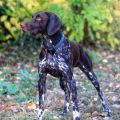The Bernese Hound, also known as the Swiss Hound, is a beautiful and versatile dog breed that hails from Switzerland. This breed is highly regarded for its exceptional hunting skills, loyalty, and gentle nature. With its striking appearance and impressive abilities, the Bernese Hound has gained popularity not only as a hunting companion but also as a beloved family pet.
The history of the Bernese Hound can be traced back to the 19th century when Swiss breeders aimed to create a versatile hunting dog that could excel in various terrains and climates. They achieved this by crossing local Swiss scent hounds with various European hound breeds, including the Bloodhound and the Hanoverian Hound. The result was a dog with exceptional scenting abilities, endurance, and a strong hunting drive.
According to the FCI (Fédération Cynologique Internationale) typology, the Bernese Hound belongs to Group 6, Section 1.2, which includes Scenthounds and related breeds. This group is further divided into two categories: Large Hounds and Medium-sized Hounds. The Bernese Hound falls under the Large Hounds category due to its robust build and size.
The Bernese Hound is primarily bred for hunting purposes, particularly for tracking and trailing game. Its exceptional scenting abilities and endurance make it well-suited for hunting in various terrains, including mountains and forests. However, due to its gentle and friendly nature, this breed has also become a popular choice for families looking for a loyal and affectionate companion.
In terms of physical characteristics, the Bernese Hound is a large and muscular dog breed. Males typically stand between 23.5 to 27.5 inches (60 to 70 cm) at the shoulder, while females are slightly smaller, measuring between 22 to 26 inches (56 to 66 cm). The weight of a Bernese Hound can range from 66 to 88 pounds (30 to 40 kg), with males being slightly heavier than females.
One of the most distinctive features of the Bernese Hound is its coat. It has a dense and shiny coat that is typically tricolor, consisting of black, white, and tan markings. The coat is medium in length and requires regular grooming to keep it in good condition. This breed also has a noble and alert expression, with expressive eyes and long, droopy ears.
The life expectancy of a Bernese Hound is around 10 to 12 years, which is relatively average for a dog of its size. However, it's important to note that like many large breeds, the Bernese Hound is prone to certain health issues, including hip dysplasia, bloat, and certain types of cancer. Regular veterinary check-ups and a healthy diet are crucial to ensure the overall well-being of this breed.
Despite its hunting background, the Bernese Hound is known for its gentle and friendly temperament. It is highly sociable and gets along well with children and other pets when properly socialized. This breed is intelligent and trainable, although it may have a stubborn streak at times. Positive reinforcement training methods work best with the Bernese Hound, as it responds well to praise and rewards.
In addition to its hunting abilities, the Bernese Hound is also known for its exceptional sense of smell. It has been used in search and rescue operations, as well as in tracking and trailing tasks. This breed's endurance and determination make it a valuable asset in various working roles.
In conclusion, the Bernese Hound is a remarkable dog breed that combines beauty, intelligence, and versatility. With its strong hunting instincts, gentle nature, and striking appearance, it has become a beloved companion for both hunters and families alike. Whether in the field or at home, the Bernese Hound is sure to leave a lasting impression with its loyalty and affectionate nature.

The Bernese Hound, also known as the Swiss Hound, is a magnificent breed that possesses a unique and captivating character. These dogs are known for their friendly and gentle nature, making them excellent companions and family pets. With their striking appearance and amiable personality, Bernese Hounds have won the hearts of dog enthusiasts worldwide.
One of the most notable traits of the Bernese Hound is their calm and composed demeanor. They are generally well-mannered and have a patient disposition, which makes them great with children and other pets. These dogs are incredibly loyal and devoted to their families, often forming strong bonds with their owners. Their affectionate nature means they thrive on human companionship and enjoy being part of family activities.
Despite their gentle nature, Bernese Hounds are also known for their alertness and intelligence. They possess a keen sense of smell and are often used as scent hounds in search and rescue operations. Their tracking abilities are exceptional, and they excel in tasks that require focus and determination. However, it is important to note that their strong hunting instincts may lead them to chase small animals, so early socialization and training are crucial.
When it comes to training, Bernese Hounds are generally eager to please and quick learners. They respond well to positive reinforcement techniques, such as treats, praise, and play. Consistency and patience are key when training these dogs, as they can be sensitive to harsh or forceful methods. Early socialization is essential to ensure they grow up to be well-rounded and confident dogs.
Exercise is vital for the Bernese Hound's overall well-being. These dogs have moderate energy levels and require daily walks or play sessions to keep them mentally and physically stimulated. They enjoy exploring their surroundings and have a natural inclination to follow scents, so providing them with a secure and fenced area to roam is ideal. Engaging them in activities like obedience training, agility, or scent work can also help channel their energy and provide mental stimulation.
In terms of grooming, Bernese Hounds have a beautiful, thick, and shiny coat that requires regular maintenance. Weekly brushing is necessary to prevent matting and keep their coat healthy. They are moderate shedders, with heavier shedding occurring during seasonal changes. Additionally, their ears should be checked regularly for cleanliness and any signs of infection.
When raising a Bernese Hound, it is important to provide them with a loving and structured environment. They thrive on routine and consistency, so establishing clear boundaries and rules from an early age is essential. Socializing them with various people, animals, and environments will help them become well-adjusted and confident adults.
In conclusion, the Bernese Hound is a breed that combines a gentle and friendly nature with intelligence and loyalty. They make excellent family pets and are well-suited for individuals or families who can provide them with the love, attention, and exercise they require. With proper training, socialization, and care, Bernese Hounds can bring immense joy and companionship to their owners for many years to come.
The Bernese Hound, also known as the Swiss Hound, is a beautiful and intelligent breed that requires proper care and attention to thrive. Here is an extensive description of the recommended care for Bernese Hound dogs, along with some helpful tips on what to do and what not to do when caring for dogs of this breed.
1. Exercise: Bernese Hounds are an active breed that requires regular exercise to maintain their physical and mental well-being. Aim for at least 60 minutes of exercise daily, which can include walks, runs, or playtime in a securely fenced yard. Engaging them in activities like obedience training, agility, or scent work can also help keep them mentally stimulated.
2. Grooming: Bernese Hounds have a dense, medium-length coat that requires regular grooming to keep it healthy and free from mats. Brush their coat at least once or twice a week to remove loose hair and prevent tangles. During shedding seasons, daily brushing may be necessary. Pay special attention to their ears, as they are prone to ear infections, and clean them regularly. Trim their nails regularly and brush their teeth to maintain good oral hygiene.
3. Diet: Provide a well-balanced, high-quality diet that meets the nutritional needs of your Bernese Hound. Consult with your veterinarian to determine the appropriate amount of food based on their age, weight, and activity level. Avoid overfeeding, as this breed is prone to obesity, which can lead to various health issues. Ensure they have access to fresh water at all times.
4. Socialization: Bernese Hounds are generally friendly and sociable dogs. Early socialization is crucial to help them develop into well-rounded adults. Expose them to various people, animals, and environments from a young age. Enroll them in puppy classes or obedience training to help them learn proper behavior and manners.
5. Health care: Regular veterinary check-ups are essential to ensure your Bernese Hound's overall health. Vaccinations, parasite prevention, and routine screenings should be part of their healthcare regimen. This breed is prone to certain health issues, including hip and elbow dysplasia, bloat, and certain cancers. Regular exercise, a balanced diet, and maintaining a healthy weight can help minimize the risk of these conditions.
6. Temperature sensitivity: Bernese Hounds have a thick double coat that provides insulation in cold weather. However, they are sensitive to heat and can easily overheat. Avoid exercising them during the hottest parts of the day, provide shade and fresh water, and never leave them in a hot car. Consider using cooling mats or vests during hot weather to help keep them comfortable.
7. Training: Bernese Hounds are intelligent and eager to please, making them relatively easy to train. Use positive reinforcement techniques such as treats, praise, and play to motivate and reward good behavior. Consistency, patience, and firm but gentle guidance are key to successful training. Early obedience training is particularly important to establish boundaries and prevent any behavioral issues.
What not to do:
1. Do not leave your Bernese Hound alone for extended periods. They thrive on human companionship and can become anxious or develop destructive behaviors if left alone for too long.
2. Avoid overexercising your Bernese Hound, especially during their growth phase. Excessive exercise can put strain on their developing joints and increase the risk of orthopedic issues.
3. Do not neglect their dental hygiene. Poor oral health can lead to gum disease and other health problems. Regular brushing and dental check-ups are crucial.
4. Avoid using harsh training methods or punishment-based techniques. Bernese Hounds respond best to positive reinforcement and gentle guidance.
5. Do not ignore any signs of discomfort or health issues. Bernese Hounds are generally stoic and may not show obvious signs of pain or illness. Regularly monitor their behavior, appetite, and overall well-being, and seek veterinary attention if any concerns arise.
By following these care tips and being attentive to your Bernese Hound's needs, you can ensure they lead a happy, healthy, and fulfilling life as a cherished member of your family.
The Bernese Hound, also known as the Swiss Hound, is a magnificent breed that possesses a distinctive and captivating coat color. The coloration of these dogs is a defining characteristic that sets them apart from other breeds. The common color of Bernese Hound dogs is a striking combination of black, white, and tan, creating a visually stunning and harmonious appearance.
The primary color of the Bernese Hound is black, which forms the base of their coat. This deep, rich black color covers the majority of their body, giving them a regal and elegant presence. The black fur is dense and glossy, reflecting light and adding to the overall allure of the breed.
Contrasting with the black, the Bernese Hound features white markings that are strategically distributed across their body. These white patches are typically found on the chest, paws, and tip of the tail. The white coloration provides a stark contrast against the black background, creating a striking visual effect that is both eye-catching and beautiful.
Adding further depth and complexity to their coat, the Bernese Hound also displays tan markings. These tan patches are typically found above the eyes, on the cheeks, and on the lower legs. The tan coloration ranges from a warm, golden hue to a deeper, reddish-brown shade. These tan markings add warmth and dimension to the overall appearance of the dog, enhancing their natural beauty.
The distribution of these colors is not random but follows a specific pattern. The black color dominates the majority of the body, with the white and tan markings strategically placed to create a balanced and symmetrical appearance. This careful distribution of colors accentuates the breed's elegant and refined features, making them truly stand out.
The Bernese Hound's coat is not only visually appealing but also serves a practical purpose. The black color provides excellent camouflage when the dogs are working in their natural environment, allowing them to blend seamlessly with their surroundings. This coloration is a testament to the breed's history as a hunting dog, where their ability to remain inconspicuous was crucial for their success.
In conclusion, the common color of Bernese Hound dogs is a captivating combination of black, white, and tan. The black base coat, adorned with strategically placed white and tan markings, creates a visually stunning and harmonious appearance. This coloration not only adds to their overall beauty but also serves a practical purpose, allowing them to blend seamlessly with their surroundings. The Bernese Hound's coat color is a true testament to their elegance, refinement, and rich history as a hunting breed.
The Bernese Hound, also known as the Swiss Hound, is a large and active breed of dog that requires a well-balanced and nutritious diet to maintain optimal health and energy levels. Proper nutrition plays a crucial role in supporting their overall well-being, promoting strong bones and muscles, and preventing potential health issues. In this text, we will provide an extensive description of the nutrition requirements for Bernese Hound dogs, along with advice on feeding and what to avoid.
Protein is an essential component of a Bernese Hound's diet, as it helps in building and repairing tissues, supporting the immune system, and providing energy. High-quality animal-based proteins such as lean meats (chicken, turkey, beef) and fish are recommended. These can be provided through commercial dog food or homemade meals prepared under the guidance of a veterinarian or canine nutritionist.
Carbohydrates are another important part of their diet, providing energy and fiber. Whole grains like brown rice, oats, and quinoa are excellent sources of complex carbohydrates. These grains should be cooked thoroughly to enhance digestibility. Additionally, vegetables like sweet potatoes, carrots, and green beans can be included to provide essential vitamins and minerals.
Fats are a concentrated source of energy and are necessary for the absorption of fat-soluble vitamins. Healthy fats, such as those found in fish oil, flaxseed oil, and olive oil, should be included in moderate amounts. Avoid excessive fat intake, as it can lead to obesity, which is a common issue in Bernese Hounds.
Feeding frequency and portion control are crucial to prevent overeating and weight gain. Adult Bernese Hounds should be fed twice a day, while puppies may require more frequent meals. Consult with your veterinarian to determine the appropriate portion sizes based on your dog's age, weight, and activity level. Avoid free-feeding or leaving food out all day, as it can lead to obesity.
It is important to note that Bernese Hounds are prone to certain health issues, including hip and elbow dysplasia, bloat, and cancer. To minimize the risk of these conditions, it is advisable to avoid overfeeding and rapid growth. Rapid growth can be controlled by feeding a balanced diet specifically formulated for large breed puppies. Controlled growth helps to ensure proper bone development and reduces the risk of joint issues.
While some human foods are safe for dogs, others can be toxic. It is essential to avoid feeding Bernese Hounds foods such as chocolate, grapes, raisins, onions, garlic, and anything containing xylitol, as these can be harmful or even fatal to dogs. Additionally, avoid giving them fatty or spicy foods, as they can cause digestive upset.
Proper hydration is also crucial for Bernese Hounds. Always provide fresh and clean water, especially during hot weather or after exercise. Monitor their water intake to ensure they are adequately hydrated.
In conclusion, a well-balanced and nutritious diet is vital for the health and well-being of Bernese Hound dogs. Providing high-quality proteins, complex carbohydrates, and healthy fats, while avoiding excessive fat intake and toxic foods, will help maintain their optimal health. Regular consultations with a veterinarian or canine nutritionist can provide further guidance on specific dietary needs and ensure your Bernese Hound receives the best nutrition possible.





